(外研版)初中英语笔记 初二(下)
八下外研版英语知识点梳理

八下外研版英语知识点梳理八年级下册外研版英语是英语学习的一个重要阶段,本文将为您梳理八下外研版英语的知识点,助您在学习英语过程中能够更好地掌握相关知识。
Unit 1 School life本单元主要介绍了学校生活中的一些常见场景和相关词汇,例如:考试、课程表、学校设施等。
学习重点是正确理解和使用有关学校生活的日常用语,提高听说能力。
Unit 2 Growing pains本单元主要介绍了青少年成长中面临的困扰和压力,例如:学业压力、亲子关系、归属感等。
学习重点是学会表达自己的感受,并尝试提出解决问题的建议。
Unit 3 Travel journal本单元主要介绍了旅行日记的撰写方法和旅行经历的交流,通过学习旅行相关的词汇和表达方式,提高学生的写作和口语能力。
Unit 4 Wild animals本单元主要介绍了一些野生动物的特征和保护。
学习重点是掌握常见动物的名称和特征,并了解野生动物保护的重要性。
Unit 5 Food and restaurants本单元主要介绍了餐饮相关的词汇和情景对话,例如:点餐、支付等。
学习重点是学会使用英语进行简单的餐饮交流,提高听说能力。
Unit 6 Inventors and inventions本单元主要介绍了一些发明家和他们的发明,通过学习相关词汇和阅读材料,了解科技对人类生活的影响并激发学生的创造力。
Unit 7 TV programmes本单元主要介绍了电视节目的种类和观看习惯,学习重点是学会用英语描述不同类型的电视节目,提高阅读和听说能力。
Unit 8 Water本单元主要介绍了水资源的重要性和节约用水的方法。
学习重点是学会提出合理的建议,并倡导节约用水的观念。
Unit 9 A busy day本单元主要介绍了一天中不同活动的时间安排和日常生活的表达。
学习重点是学会询问时间、描述日常活动,并提高听说能力。
Unit 10 Colours本单元主要介绍了颜色的基本概念和颜色在生活中的运用。
外研版八年级下册笔记分享
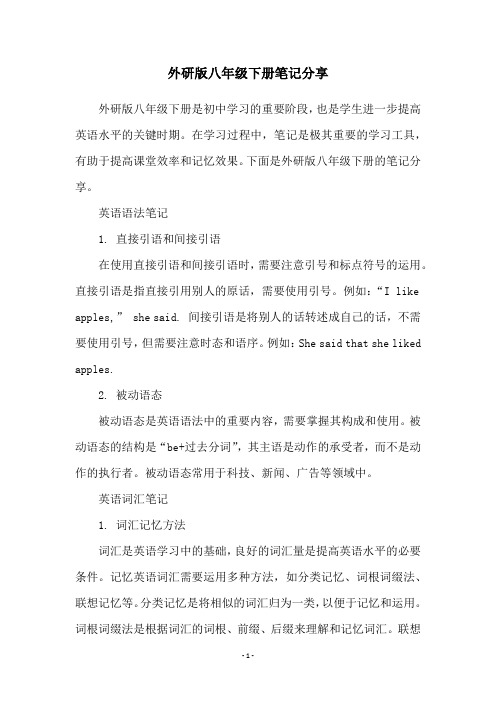
外研版八年级下册笔记分享外研版八年级下册是初中学习的重要阶段,也是学生进一步提高英语水平的关键时期。
在学习过程中,笔记是极其重要的学习工具,有助于提高课堂效率和记忆效果。
下面是外研版八年级下册的笔记分享。
英语语法笔记1. 直接引语和间接引语在使用直接引语和间接引语时,需要注意引号和标点符号的运用。
直接引语是指直接引用别人的原话,需要使用引号。
例如:“I like apples,” she said. 间接引语是将别人的话转述成自己的话,不需要使用引号,但需要注意时态和语序。
例如:She said that she liked apples.2. 被动语态被动语态是英语语法中的重要内容,需要掌握其构成和使用。
被动语态的结构是“be+过去分词”,其主语是动作的承受者,而不是动作的执行者。
被动语态常用于科技、新闻、广告等领域中。
英语词汇笔记1. 词汇记忆方法词汇是英语学习中的基础,良好的词汇量是提高英语水平的必要条件。
记忆英语词汇需要运用多种方法,如分类记忆、词根词缀法、联想记忆等。
分类记忆是将相似的词汇归为一类,以便于记忆和运用。
词根词缀法是根据词汇的词根、前缀、后缀来理解和记忆词汇。
联想记忆是根据词汇的音、形、义、位等特点,与其他词汇进行联系和比较,以便于记忆和理解。
2. 词汇的拓展在掌握基本词汇的基础上,拓展词汇量也是提高英语水平的重要方法。
拓展词汇可以通过阅读、听力、写作等方式进行。
通过阅读,可以了解到更多的词汇和用法,并加深对语言的理解。
通过听力,可以学习到地道的英语发音和语境下的使用方法。
通过写作,可以锻炼自己的表达能力和语言思维能力。
拓展词汇需要持之以恒,不断地学习和运用。
总之,外研版八年级下册的笔记需要注意准确性、完整性和条理性,可以辅助自己更好地掌握英语语法和词汇,提高英语水平。
八年级下册英语外研版m6u3笔记

八年级下册英语外研版m6u3笔记八年级下册英语外研版M6U3的笔记内容包括:1.笔记标题:Unit 3: My weekend2.语法点:一般过去时(simple past tense)3.语法规则:-一般过去时用来表示过去发生的动作或存在的状态。
-在一般过去时中,动词的过去式是通过在动词原形后面加-ed来表示的,但也有一些不规则的动词形式,需特别记忆。
-在一般过去时中,be动词的过去式为was和were。
如果主语是第一人称单数或第三人称单数,则用was;如果主语是第二人称单数或复数,则用were。
-一般过去时还可以用于表示过去的习惯、经常性的动作或存在的状态。
4.词汇:- weekend周末- visit拜访- meet遇见- have fun玩得开心- take photos拍照- go fishing去钓鱼- fly a kite放风筝- go hiking去远足- play basketball打篮球- collect收集- stamp邮票- coin硬币- postcard明信片- feed喂养- farm农场- mountain山- lake湖- river河流- beach海滩- forest森林5.重点句式:- What did you do last weekend?(你上周末做了什么?)- We went hiking in the mountains.(我们去山上远足。
)- I met my friends and we played basketball together.(我见到了我的朋友,我们一起打篮球。
)- Did you take any photos?(你拍了些照片吗?)- Yes, I took a lot of photos.(是的,我拍了很多照片。
)- No, I didn't take any photos.(不,我没有拍照。
)6.例句:- I visited my grandparents and had a great time.(我拜访了我的祖父母,并度过了美好的时光。
(外研版)初中英语笔记初二(下)
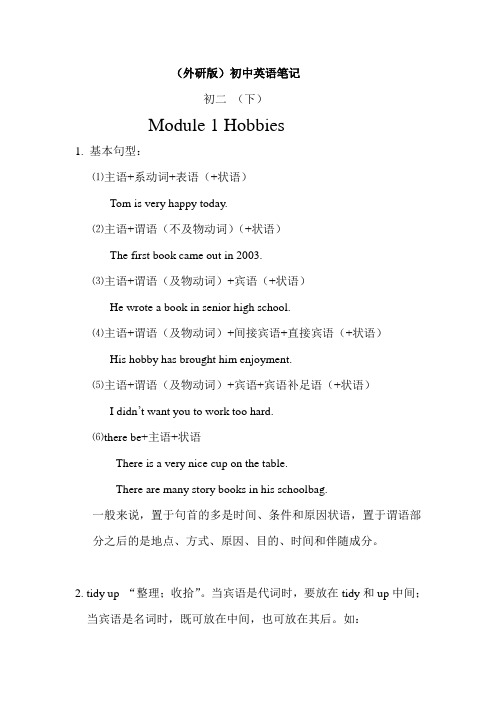
(外研版)初中英语笔记初二(下)Module 1 Hobbies1. 基本句型:⑴主语+系动词+表语(+状语)Tom is very happy today.⑵主语+谓语(不及物动词)(+状语)The first book came out in 2003.⑶主语+谓语(及物动词)+宾语(+状语)He wrote a book in senior high school.⑷主语+谓语(及物动词)+间接宾语+直接宾语(+状语)His hobby has brought him enjoyment.⑸主语+谓语(及物动词)+宾语+宾语补足语(+状语)I didn’t want you to work too hard.⑹there be+主语+状语There is a very nice cup on the table.There are many story books in his schoolbag.一般来说,置于句首的多是时间、条件和原因状语,置于谓语部分之后的是地点、方式、原因、目的、时间和伴随成分。
2. tidy up “整理;收拾”。
当宾语是代词时,要放在tidy和up中间;当宾语是名词时,既可放在中间,也可放在其后。
如:Your room is untidy. Can you tidy it up?The students tidied up the classroom.(类似的还有turn on, turn off, put on, write down等动词+副词形式)3. listen to sb. do sth. 听见某人做某事。
I often listen to him play the violin.(类似于see, hear等后面可以接不带to的动词不定式)4. 当play后面接表示乐器的名词时,需要在该名词前加上定冠词the;如:play the piano, play the flute(笛子)当play后面接表示球类的名词时,该名词前不接任何冠词。
新外研版八年级英语(下册)重点知识点总结

外研版八年级英语下册重点知识点Module1语法:系动词:一是(be:am,is,are,been,was,were),一觉得(feel),一好像(seem),一保持(keep),三变化(turn,become,get),四起来(smell,sound,look,taste),后跟形容词..11.三到达:arriveat(小地方),arrivein(大地方),getto=reach注意:跟home,here,there等副词时,不加介词.12.quite相当,很,相当于very,区别,quitea../quitean..而very只能放在a/an后13.with有,带有;和…一起;使用等.反义词without14.lovely:令人愉快的,可爱的修饰人或物alovelyafternoon/girllively:活泼的,生动的alivelylesson:一堂生动的课16.四个花费:take:Ittakessb.sometimetodosth./Ittooksb.sometimetodosth.Spend:Sb.spendsometime/moneyonsthSb.spendsometime/money(in)doingsth.Pay:Sb.paysomemoneyforsth.cost:sthcostsb.somemoney.,暗示.注意:词数70左右。
Ihaveanetfriend.SheisfromSydney,Australia.Thegirlisfifteenyearsold.Sheisthinwithtwo bigeyes.Shehaslongfairhair.Sheisfriendlyandoutgoing.Shealwayshasabigsmileonherface.S helikesreadingandchattingontheInternetwithherfriends.Shesaidthatreadingmadehergrowup asaperson.IfeelveryhappywhenIchatwithher.Ilikemynetfriendverymuch.IhopeIcangotoSyd neytoseeheroneday.Module2语法:现在完成时:表过去发生或已经完成的某一动作,对现在造成的影响和结果,或持续到现在的动作。
八年级下册外研版英语笔记m1
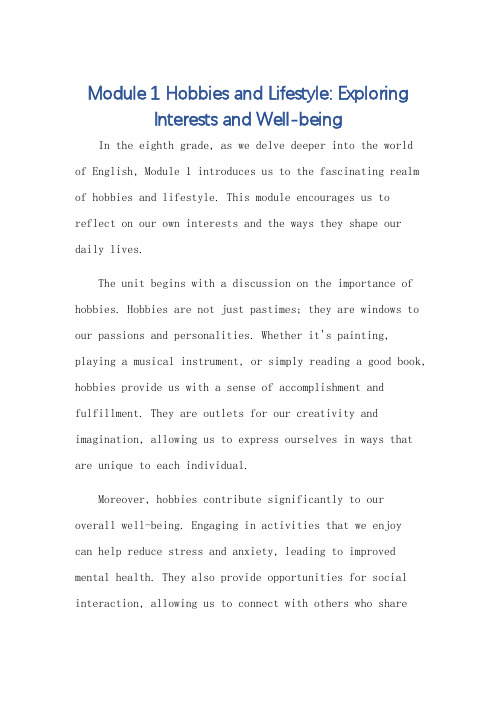
Module 1 Hobbies and Lifestyle: ExploringInterests and Well-beingIn the eighth grade, as we delve deeper into the worldof English, Module 1 introduces us to the fascinating realm of hobbies and lifestyle. This module encourages us toreflect on our own interests and the ways they shape our daily lives.The unit begins with a discussion on the importance of hobbies. Hobbies are not just pastimes; they are windows to our passions and personalities. Whether it's painting, playing a musical instrument, or simply reading a good book, hobbies provide us with a sense of accomplishment and fulfillment. They are outlets for our creativity and imagination, allowing us to express ourselves in ways that are unique to each individual.Moreover, hobbies contribute significantly to ouroverall well-being. Engaging in activities that we enjoycan help reduce stress and anxiety, leading to improved mental health. They also provide opportunities for social interaction, allowing us to connect with others who shareour interests. This social aspect of hobbies can be especially beneficial for our emotional well-being.As we progress through the module, we are introduced to a variety of hobbies and the people who pursue them. These stories are not just about the activities themselves butalso about the passions and dreams that drive these individuals. They inspire us to explore our own interests and perhaps even pursue new hobbies that we had never considered before.One of the key lessons of this module is the understanding that every hobby, no matter how big or small, has the potential to bring joy and fulfillment to our lives. It reminds us that our interests are not just hobbies but reflections of our values and aspirations.Additionally, the module emphasizes the importance of maintaining a healthy lifestyle. While hobbies areessential for our mental and emotional well-being, a balanced lifestyle also includes physical activity and healthy eating habits. The unit discusses how hobbies can complement a healthy lifestyle, such as participating insports or engaging in physical activities that are related to our hobbies.Overall, Module 1 on hobbies and lifestyle is athought-provoking exploration of what brings us joy and fulfillment. It encourages us to embrace our passions, pursue our interests, and create a lifestyle that is both fulfilling and healthy. Through this module, we learn to appreciate the unique ways that hobbies shape our lives and contribute to our overall well-being.**爱好与生活方式:探索兴趣与健康**八年级时,我们深入英语世界的学习,第一模块向我们介绍了令人着迷的爱好与生活方式领域。
外研版八年级英语下册重要知识点归纳
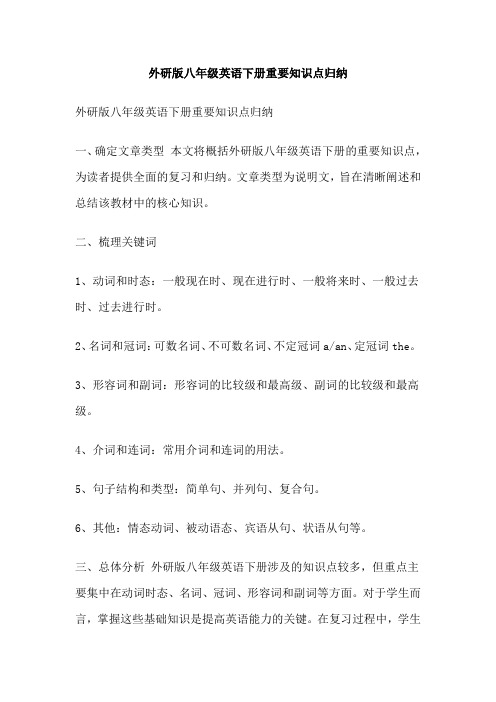
外研版八年级英语下册重要知识点归纳外研版八年级英语下册重要知识点归纳一、确定文章类型本文将概括外研版八年级英语下册的重要知识点,为读者提供全面的复习和归纳。
文章类型为说明文,旨在清晰阐述和总结该教材中的核心知识。
二、梳理关键词1、动词和时态:一般现在时、现在进行时、一般将来时、一般过去时、过去进行时。
2、名词和冠词:可数名词、不可数名词、不定冠词a/an、定冠词the。
3、形容词和副词:形容词的比较级和最高级、副词的比较级和最高级。
4、介词和连词:常用介词和连词的用法。
5、句子结构和类型:简单句、并列句、复合句。
6、其他:情态动词、被动语态、宾语从句、状语从句等。
三、总体分析外研版八年级英语下册涉及的知识点较多,但重点主要集中在动词时态、名词、冠词、形容词和副词等方面。
对于学生而言,掌握这些基础知识是提高英语能力的关键。
在复习过程中,学生应结合教材中的例句和练习题,深入理解各个知识点的用法和意义。
四、具体展开1、动词和时态:熟练掌握一般现在时(表示习惯或经常发生的动作)、现在进行时(表示正在进行的动作)、一般将来时(表示将来要发生的动作)、一般过去时(表示过去发生的动作)和过去进行时(表示过去正在进行的动作)。
注意动词的形式变化,如第三人称单数、过去分词等。
2、名词和冠词:理解可数名词和不可数名词的区别,掌握不定冠词a/an和定冠词the的用法。
注意名词的数与量的搭配,如a piece of paper, two pieces of paper等。
3、形容词和副词:掌握形容词的比较级和最高级(如big-bigger-biggest),了解副词的比较级和最高级(如fast-faster-fastest)的构成和用法。
同时,要学会使用形容词和副词来描述事物和动作,如She sings beautifully. The car drives quickly.4、介词和连词:掌握常用介词的用法,如in, on, at, for等,以及常用连词的用法,如and, but, or等。
八年级下册英语外研版课堂笔记
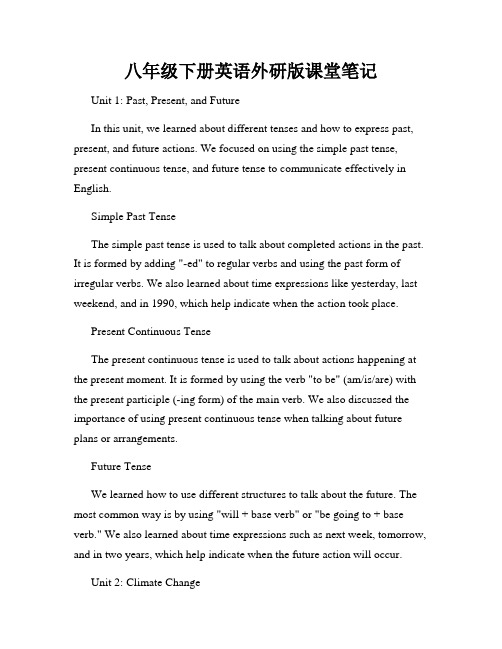
八年级下册英语外研版课堂笔记Unit 1: Past, Present, and FutureIn this unit, we learned about different tenses and how to express past, present, and future actions. We focused on using the simple past tense, present continuous tense, and future tense to communicate effectively in English.Simple Past TenseThe simple past tense is used to talk about completed actions in the past. It is formed by adding "-ed" to regular verbs and using the past form of irregular verbs. We also learned about time expressions like yesterday, last weekend, and in 1990, which help indicate when the action took place.Present Continuous TenseThe present continuous tense is used to talk about actions happening at the present moment. It is formed by using the verb "to be" (am/is/are) with the present participle (-ing form) of the main verb. We also discussed the importance of using present continuous tense when talking about future plans or arrangements.Future TenseWe learned how to use different structures to talk about the future. The most common way is by using "will + base verb" or "be going to + base verb." We also learned about time expressions such as next week, tomorrow, and in two years, which help indicate when the future action will occur.Unit 2: Climate ChangeIn this unit, we explored the topic of climate change and its impact on the environment. We discussed the causes and consequences of global warming and ways to reduce our carbon footprint.Causes of Climate ChangeWe studied the major causes of climate change, including greenhouse gas emissions from human activities such as burning fossil fuels, deforestation, and industrial processes. We also learned about natural causes such as volcanic eruptions and solar radiation.Consequences of Climate ChangeWe examined the various consequences of climate change, including rising global temperatures, melting ice caps, sea-level rise, extreme weather events, and the loss of biodiversity. We discussed how these changes affect ecosystems, human health, and the overall well-being of our planet.Reducing Our Carbon FootprintWe explored different ways we can reduce our carbon footprint and contribute to mitigating climate change. These include using renewable energy sources, conserving energy at home and school, promoting sustainable transportation, and practicing waste reduction and recycling.Unit 3: Cultural DifferencesIn this unit, we explored the concept of cultural differences and the importance of cultural awareness in our global society. We learned about different customs, traditions, and behaviors in various countries and how to respect and appreciate diversity.Understanding Cultural DifferencesWe discussed the importance of understanding cultural differences to avoid misunderstandings and conflicts. We learned about different cultural practices such as greetings, gestures, and dining etiquettes in various countries. By being culturally sensitive, we can foster better communication and build stronger relationships with people from different backgrounds.Respecting DiversityWe emphasized the significance of respecting diversity and treating everyone with equality and fairness. We learned about the importance of avoiding cultural stereotypes and prejudices. By embracing diversity, we can create an inclusive and harmonious environment where everyone feels valued and respected.ConclusionThroughout this unit, we have learned valuable lessons about different tenses, climate change, and cultural diversity. These topics not only enhance our English language skills but also broaden our knowledge and understanding of the world around us. By applying what we have learned in our daily lives, we can become more effective communicators, environmentally conscious individuals, and culturally aware global citizens.。
外研版八下英语复习笔记语法

外研版八下英语复习笔记语法集团档案编码:[YTTR-YTPT28-YTNTL98-UYTYNN08]四册笔记:M1语法:1.感官系动词五“起来”,形容词紧紧跟上来。
lookn._______v._______smell,n._______v._______tasten._______v._______ soundn._______v._______feeln._______v.________2.感官实义动词四看二听:see,watch,find,notice,hear,listento,接v原表示经常或过程,接ing表示正在。
M1,U11.Whatadelicioussmell!多香的味道。
感叹句:How+adj(+主谓)!What+a/an+adj+n(+主谓)!2.Wouldyouliketodosth=Doyouwanttodosth 你想要做某事吗?3.trysome/tryapiece/haveatry.尝一些,尝一块,尝一尝。
4.yes,please./No,thanks.(当别人主动提供你东西时的答语。
)5.What’sthatontop顶部是什么?6.I’mafraid+that从句/ofsth/todosth我恐怕…7.Itdoesn`tsmellfresh.感官动词借助于助动词来完成句型变化。
8.abitsour.有点酸。
abit+n=alittle+n/abit+adj=alittle+adj9.bedone(被)做完了10.inthemiddle.在中间11.makeanapplepie做个苹果馅饼12.haveasweettooth爱吃甜食13.ShallI/wedosth我、我们做某事好吗?14Areyousure+todosth/ofsth/that从句…你确定….吗?15.strawberryjam草莓酱16.Everythingtastessosweet!所有东西都尝起来这么甜。
外研版八年级英语下册重要知识点归纳

外研版八年级英语下册重要知识点归纳以下是外研版八年级英语下册的重要知识点归纳:1. 宾语从句:宾语从句是一个句子作为动词的宾语。
宾语从句一般使用连接词that、whether或if引导。
2. 定语从句:定语从句是一个句子作为名词的修饰语。
定语从句一般使用关系代词who、which、that或关系副词when、where、why引导。
3. 状语从句:状语从句是一个句子作为动词、形容词或副词的状语。
常见的状语从句有时间状语从句、条件状语从句、目的状语从句、结果状语从句、原因状语从句等。
4. 过去完成时:过去完成时表示过去某个时间或动作之前已经完成的动作或状态。
5. 被动语态:被动语态是表示主语是动作的承受者。
被动语态的结构为be动词的相应形式+过去分词。
6. 情态动词:情态动词是用来表示说话人的情态或说话人的看法的动词。
常见的情态动词有can、could、may、might、will、would、shall、should、must等。
7. 直接引语和间接引语:直接引语是直接用人物原话表达出来,间接引语是将原话转述出来。
在引述时,常用的动词有say、tell、ask等。
8. 虚拟语气:虚拟语气是用来表示说话人所说的情况与实际情况相反或不可能实现的情况。
虚拟语气有三种形式:虚拟条件句、虚拟语气的表示方式以及与过去事实相反的虚拟形式。
9. 倒装句:英语中一般将助动词或情态动词放在主语之前构成倒装句。
常见的倒装句有完全倒装、部分倒装和否定副词位于句首的倒装。
10. 名词性从句:名词性从句是一个句子作为名词的成分。
常见的名词性从句有主语从句、宾语从句、表语从句和同位语从句。
11. 同位语从句:同位语从句是一个句子作为另一个句子中某个词或短语的同位语。
同位语从句一般使用连接词that引导。
12. 非谓语动词:非谓语动词包括不定式、动名词和分词。
非谓语动词一般能够独立地在句中作某个成分,如主语、宾语、表语、定语等。
外研版初中英语八年级下册知识点归纳总结
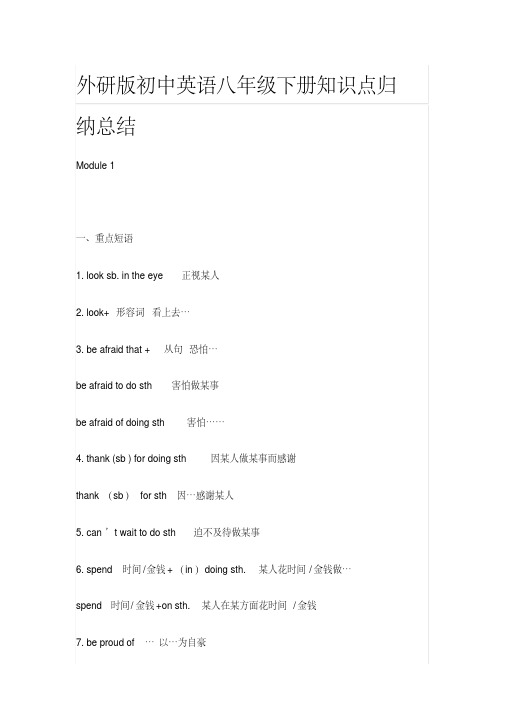
外研版初中英语八年级下册知识点归纳总结Module 1一、重点短语1. look sb. in the eye 正视某人2. look+形容词看上去…3. be afraid that +从句恐怕…be afraid to do sth 害怕做某事be afraid of doing sth 害怕……4. thank (sb ) for doing sth 因某人做某事而感谢thank(sb)for sth 因…感谢某人5. can’t wait to do sth 迫不及待做某事6. spend 时间/金钱+(in)doing sth. 某人花时间/金钱做…spend 时间/金钱+on sth. 某人在某方面花时间/金钱7. be proud of…以…为自豪8. be proud to do sth. 为做某事而感到自豪9. be proud that…为……感到自豪10. hear from/ receive a letter from... 收到......的来信11. each other 互相,彼此12. arrive in/at 到达13. be good at 擅长,善于14. have a try 尝试15. on top 在上面,处于优势16. in the middle 在中间17. as well 也;还18. in the right way 以正确的方式19. be excited about 对...兴奋20. shake hands 握手21. close to 离......近二、重点句型1. 它闻起来不新鲜。
It doesn’t smell fresh.2. 每种东西都(尝起来)甜滋滋的。
Everything tastes so sweet.3. 多好闻的味道啊!What a delicious smell.4. ——你想来点尝尝吗?——好的,谢谢。
---Would you like to try some? ---Yes, please.5. 我喜欢甜食。
外研版八下英语复习笔记语法.

M1语法:1.感官实义动词四看二听:see, watch, find , notice, hear, listen to ,接动词原形表示经常或过程,接动词-ing表示正在。
M1,U11.What a delicious smell!多香的味道。
感叹句:How +adj (+主谓)!What +a/an +adj +n(+主谓)!2.Would you like to do sth ?=Do you want to do sth ?你想要做某事吗?3.try some / try a piece / have a try.尝一些,尝一块,尝一尝。
4. yes, please. / No, thanks .(当别人主动提供你东西时的答语。
)5.What’s that on top? 顶部是什么?6.I’m afraid +that从句/of sth / to do sth 我恐怕…7.It doesn`t smell fresh. 感官动词借助于助动词来完成句型变化。
8. a bit sour. 有点酸。
a bit +n = a little +n / a bit +adj = a little +adj9.be done (被)做完了10.in the middle. 在中间11. make an apple pie 做个苹果馅饼12.have a sweet tooth爱吃甜食13. Shall I/ we do sth ? 我、我们做某事好吗?14 Are you sure + to do sth /of sth / that 从句…你确定….吗?15.strawberry jam草莓酱16.Everything tastes so sweet! 所有东西都尝起来这么甜。
(不定代词做主语谓语用单数。
)17.It’s my lucky day! 是我的幸运日。
M1 Unit 21. Welcome to sw 欢迎来某地2.Thanks for sth \ doing sth 为(做)某事儿感谢你3.hear from sb= receive a letter from sb收到来自某人的信4.can’t wait to do sth 迫不及待做某事5.know me from my photo 从照片中认识我6.arrive at= reach = get to 到达7. with short fair hair 有短的金色的头发8.wear glasses戴眼镜/ wear jeans 穿牛仔裤9.I’m sure of sth / to do sth / that从句我确信…10.each other 互相11.tell sb about sth 告诉某人关于某事12.You sound just like me!你听起来恰好就像我。
Module 8课文知识点总结(含语法)-外研版八年级下册英语

2021~2022学年新课标外研版初中英语学习讲义八年级下学期Module 8课文知识点总结笔记Module 8 Time off语法:that引导的宾语从句一、放在动词后面的句子,称为“宾语从句”二、可分为三类:一类是that引导的宾语从句;一类是whether/ if引导的宾语从句;一类是连接代词,连接副词引导的宾语从句。
三、that引导的宾语从句1.宾语从句的引导词是that,当谓语动词表示肯定的概念,如“希望”“相信”“知道”或“说”时,后面的句子一般用that引导,that没有任何意义。
只有语法功能,目的使读者清楚后面的句子是宾语从句,that可省略。
接that引导的宾语从句的动词有:believe, expect, explain, feel, hear, hope, imagine, prefer, promise, report, say, see, tell, think, understand, warn, wish 等。
引导that用于下列情况时不可省略:(1)当宾语从句的主语是that时,Eg: He says that that is a useful book.(2)当从句前有插入语时Eg: It says, on the card, that it is made in China.(3)当宾语从句中含主从复合句时Eg: I’m afraid that if you’ve lost it, you must pay for it.(4)当两个或多个宾语从句由并列连词连接时,除第一个从句中的that 可省略外,其余从句中的that都不可省略Eg: He said (that) the film was very interesting and that he enjoyed seeing it very much.2.宾语从句的时态:(1)主句是现在的某种时态,那么宾语从句的时态可根据实际情况而定Eg: (1) I remember he gave me a book yesterday.(2) He has told me that he’ll leave for New York tomorrow.(2)如果主句是过去的某种时态,宾语从句一定要用过去的某种时态。
八下英语笔记外研版

八下英语笔记外研版Words and Expressions1. get along: have a good relationship with someone2. be keen on: be very interested in something3. hit it off: get along with someone immediately4. have something in common: share similar interests or experiences with someone5. break the ice: to do something to make people feel more relaxed and comfortable, especially at the start of a meeting or party6. keep in touch: to stay in contact with someone7. make a good impression: to cause someone to have a positive opinion of you8. hang out: to spend time with someone9. have a lot in common: to share many interests, experiences, or characteristics with someone10. keep to oneself: to be shy and prefer to be alone11. take the initiative: to be the first one to make a move or start something Sentences and Phrases1. I always get along well with my classmates.2. She is keen on drawing and painting.3. We hit it off as soon as we met.4. We have a lot in common, so we get along really well.5. He tried to break the ice by telling a funny joke.6. I always keep in touch with my old friends from high school.7. She made a good impression on her new boss.8. I like to hang out with my friends on the weekend.9. We have a lot in common, so we get along really well.10. He tends to keep to himself, but he's really nice once you get to know him.11. She took the initiative to start a conversation with the new student.Conversation and DialogueA: Have you met the new girl in our class?B: Yes, I have. She seems really nice.A: I think I hit it off with her. We both love reading and drawing.B: That's great! It's always nice to make new friends who have things in common with you. Reading and ComprehensionTitle: Making New FriendsMaking new friends can be both exciting and nerve-wracking. It's important to put yourself out there and try to get to know new people. One way to make new friends is to try to find common interests. When you find someone who shares similar hobbies or passions with you, it can be easier to get along and build a friendship. It's also important to take the initiative when making new friends. Don't wait for someone else to start a conversation or hang out. Be the first to reach out and make plans to spend time together. Building and maintaining friendships takes effort, but having good friends can make life more enjoyable and fulfilling.Unit 2 My HobbiesWords and Expressions1. passion: a strong feeling or enthusiasm for something2. pastime: an activity that someone does regularly for enjoyment rather than work; a hobby3. take up: to start doing something new4. give up: to stop doing something that you have been doing regularly5. be interested in: to find something appealing or engaging6. be crazy about: to be extremely enthusiastic about something7. spend time/ money on: to use your time or money on something8. get into: to become interested in or involved in something9. put off: to delay or postpone10. have a go at: to try to do something, especially something that you have never done beforeSentences and Phrases1. Drawing has always been a passion of mine.2. My favorite pastime is reading.3. I recently took up playing the guitar.4. She gave up playing the piano because she didn't enjoy it.5. I'm interested in learning a new language.6. He's crazy about playing video games.7. I like to spend time on my hobbies during the weekend.8. I recently got into cooking and I love it.9. I put off going to the gym because I was too tired.10. I'm going to have a go at skydiving next month.Conversation and DialogueA: What are your hobbies?B: I have a few, but my main passion is photography.A: That sounds interesting. I recently took up painting as a hobby.B: That's great! It's always nice to have something to do in your free time.A: Yeah, it's a great way to relax and be creative.Reading and ComprehensionTitle: Finding Joy in HobbiesHaving hobbies can bring a lot of joy and fulfillment into our lives. Whether it's playing a musical instrument, participating in a sport, or crafting, hobbies provide an outlet for us to express ourselves and do something that we love. Hobbies can also help us to relax and de-stress after a long day of work or school. It's important to make time for our hobbies and not let them fall by the wayside. We should prioritize our hobbies and make them a regular part of our lives. Additionally, trying out new hobbies and activities can open up new opportunities for growth and learning. So, let's all make time to pursue our passions and find joy in our hobbies.Unit 3 My Daily RoutineWords and Expressions1. routine: a sequence of actions that is regularly followed2. schedule: a plan that gives a list of events or activities and the times at which they will happen3. habit: something that you do often and regularly, sometimes without knowing that you are doing it4. take a shower: to bathe by standing upright and letting water fall on the body5. have breakfast/ lunch/ dinner: to eat the first/ midday/ main meal of the day Sentences and Phrases1. I have a pretty regular daily routine.2. My schedule is packed with meetings and appointments.3. I have a habit of drinking coffee in the morning.4. I always take a shower before I go to bed.5. I usually have breakfast at around 8 am.Conversation and DialogueA: What's your daily routine like?B: I usually wake up at around 7 am, take a shower, and then have breakfast.A: That sounds similar to my morning routine. I also have breakfast at around 8 am.B: It's important to have a regular routine to help us stay organized and focused.Reading and ComprehensionTitle: The Importance of Daily RoutinesHaving a daily routine helps us to stay organized and manage our time efficiently. It's important to have a set schedule for our daily activities, including waking up, eating meals, exercising, working, and relaxing. Having a routine can help reduce stress and make us feel more in control of our day. It's also important to have a healthy balance in our routines, including time for work, rest, and leisure. This can help us to maintain a healthy lifestyle and avoid burnout. While it's important to have structure in our daily routines, it's also important to be flexible and make time for unexpected events or changes. Overall, having a daily routine can help us to stay on track and make the most of each day.Unit 4 My Dream SchoolWords and Expressions1. ideal: perfect or the best possible2. facility: a place, especially including buildings, where a particular activity happens3. offer: provide or supply for use or consideration4. promote: support or actively encourage5. challenging: difficult in an interesting or enjoyable way6. motivating: providing encouragement to act in a particular waySentences and Phrases1. My ideal school would have a lot of great facilities.2. I wish my school would offer more extracurricular activities.3. I want to promote a culture of diversity and inclusion in my school.4. I want to attend a school that offers challenging courses.5. I hope to be in a motivating and supportive academic environment.Conversation and DialogueA: What would your dream school be like?B: My ideal school would have state-of-the-art facilities for science and technology.A: That sounds amazing. I would love to attend a school like that too.B: I think it's important for schools to provide students with the best resources for learning and growth.Reading and ComprehensionTitle: Building the School of Your DreamsWe all have our own vision of what the ideal school would look like. Whether it's state-of-the-art facilities, a diverse and inclusive community, or challenging academic programs, our dream school represents the environment where we can thrive and reach our full potential. While it may be idealistic to imagine a perfect school, it's important to articulate our desires and work towards creating positive change in our educational institutions. By promoting a culture of learning, diversity, and support, we can build schools that not only meet the needs of their students but also inspire them to achieve greatness. It's through these efforts that we can work towards creating the dream schools that we all deserve.Unit 5 My School LifeWords and Expressions1. student council: a representative structure for students only, through which they can become involved in the affairs of the school2. campus: the grounds and buildings of a university or college3. extracurricular: activities that fall outside the realm of the normal curriculum of school4. cafeteria: a restaurant in which customers serve themselves from a range of dishes laid out on a counter5. library: a building or room containing collections of books, periodicals, and sometimes films and recorded music for people to read, borrow, or refer to6. counselor: a person trained to give guidance on personal or psychological problems Sentences and Phrases1. I'm running for the student council this year.2. Our campus is quite large, with many different buildings.3. I love participating in extracurricular activities after school.4. I eat lunch in the school cafeteria every day.5. I spend a lot of time studying in the library.6. The school counselor has been very supportive and helpful to me.Conversation and DialogueA: What extracurricular activities do you participate in?B: I'm in the school band and I also play on the basketball team.A: That's great. I'm thinking of joining the art club this year.B: It's always fun to be involved in activities outside of class.Reading and ComprehensionTitle: Making the Most of School LifeSchool life is about more than just attending classes and studying. It's an opportunity to explore interests, make friends, and develop important life skills. Whether it's through extracurricular activities, student council participation, or counseling services, school provides various avenues for personal growth and development. Taking advantage of these opportunities can help students to build a well-rounded experience and make the most of their time at school. It's important for students to be active members of their schoolcommunities, to learn from their experiences, and to make lasting memories. Ultimately, school life is what students make of it, and it's important to embrace all that it has to offer. Unit 6 Travelling in ChinaWords and Expressions1. diverse: showing a great deal of variety or different components2. ancient: belonging to the very distant past and no longer in existence3. stunning: extremely impressive or attractive4. authentic: made or done in the traditional or original way5. breathtaking: extraordinarily beautiful or astonishingSentences and Phrases1. China has a diverse range of landscapes and cultures.2. The country is home to many ancient historical sites.3. The Great Wall of China is a stunning sight to behold.4. I want to experience authentic Chinese cuisine.5. The scenery at the Zhangjiajie National Forest Park is breathtaking.Conversation and DialogueA: Have you traveled to any cities in China?B: Yes, I've been to Beijing and Shanghai.A: How were they?B: They were amazing! The history and culture in China are so rich and diverse. Reading and ComprehensionTitle: Exploring the Wonders of ChinaChina is a country with a rich and diverse history, as well as stunning natural landscapes. From the ancient wonders of the Great Wall to the modern marvels of Shanghai, there is something for everyone to see and experience. Whether it's exploring the terracotta warriors in Xi'an, taking a boat ride along the Li River, or tasting authentic Chinese cuisine, travelers can immerse themselves in the beauty and culture of this vast and breathtaking country. With its ancient traditions, stunning landscapes, and vibrant cities, China offers a travel experience that is both awe-inspiring and unforgettable.Unit 7 Looking for a JobWords and Expressions1. resume: a brief account of a person's education, qualifications, and previous experience, typically sent with a job application2. cover letter: a letter sent with, and explaining the contents of, another document or a parcel of goods3. interview: a formal meeting in which one or more persons question, consult, or evaluate another person4. reference: a person who knows you and is able to give information about your character and abilities5. qualification: a quality or accomplishment that makes someone suitable for a particular job or activitySentences and Phrases1. I need to update my resume before applying for any new jobs.2. I always include a cover letter with my job applications.3. I have an interview for a new job next week.4. I have a reference from my previous boss.5. I have all the necessary qualifications for this position.Conversation and DialogueA: Have you been looking for a new job?B: Yes, I've been updating my resume and sending out applications.A: Are you getting any interviews?B: I have one next week. I'm excited and nervous at the same time.Reading and ComprehensionTitle: Navigating the Job SearchLooking for a job can be a challenging and sometimes daunting process. From updating resumes and writing cover letters to preparing for interviews and securing references, there are many steps involved in finding the right job. It's important for job seekers to be diligent and proactive in their search, as well as to take advantage of networking opportunities and industry connections. While the job search can be stressful, it's also anopportunity for personal growth and development. By being persistent and resilient, job seekers can navigate the process with confidence and find the job that is the best fit for their skills and aspirations.Unit 8 Environment-Friendly LifestyleWords and Expressions1. sustainable: able to be maintained at a certain rate or level2. conservation: preservation, protection, or restoration of the natural environment, natural ecosystems, vegetation, and wildlife3. recycle: convert waste into reusable material4. renewable energy: energy from a source that is not depleted when used5. carbon footprint: the amount of carbon dioxide and other carbon compounds emitted due to the consumption of fossil fuels by a particular person or groupSentences and Phrases1. We need to adopt more sustainable practices to protect the environment.2. Conservation of natural resources is essential for future generations.3. We should recycle paper, glass, and plastic whenever possible.4. Renewable energy sources such as solar and wind power are important for reducing our carbon footprint.Conversation and DialogueA: What do you do to live a more environment-friendly lifestyle?B: I try to reduce my water and electricity usage, and I always recycle.A: That's great. Every little bit helps in protecting the environment.Reading and ComprehensionTitle: Embracing an Environment-Friendly LifestyleLiving a more environment-friendly lifestyle is not only important for our planet's sustainability but also for our own well-being. Whether it's reducing waste, conserving resources, or using renewable energy, each of us can make a positive impact on the environment. By making small changes in our daily habits, such as biking or walking instead of driving, buying products with minimal packaging, or embracing sustainable practices at home and at work, we can help to reduce our carbon footprint and preserve our naturalresources. Embracing an environment-friendly lifestyle is a collective effort that can bring about positive change and protect the planet for future generations.。
外研版八下英语m2笔记
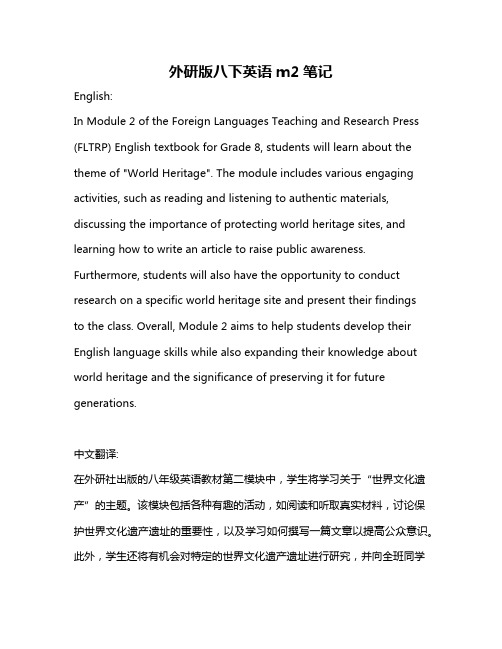
外研版八下英语m2笔记English:In Module 2 of the Foreign Languages Teaching and Research Press (FLTRP) English textbook for Grade 8, students will learn about the theme of "World Heritage". The module includes various engaging activities, such as reading and listening to authentic materials, discussing the importance of protecting world heritage sites, and learning how to write an article to raise public awareness. Furthermore, students will also have the opportunity to conduct research on a specific world heritage site and present their findingsto the class. Overall, Module 2 aims to help students develop their English language skills while also expanding their knowledge about world heritage and the significance of preserving it for future generations.中文翻译:在外研社出版的八年级英语教材第二模块中,学生将学习关于“世界文化遗产”的主题。
该模块包括各种有趣的活动,如阅读和听取真实材料,讨论保护世界文化遗产遗址的重要性,以及学习如何撰写一篇文章以提高公众意识。
英语外研版八下笔记(教师版)
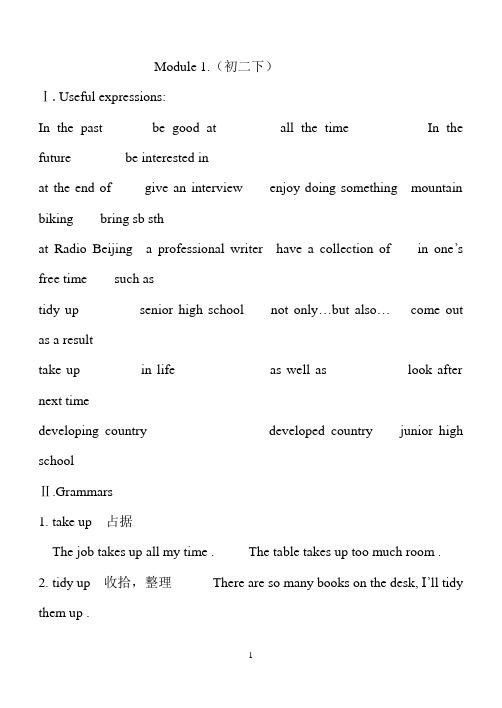
Module 1.(初二下)Ⅰ.Useful expressions:In the past be good at all the time In the future be interested inat the end of give an interview enjoy doing something mountain biking bring sb sthat Radio Beijing a professional writer have a collection of in one’s free time such astidy up senior high school not only…but also…come out as a resulttake up in life as well as look after next timedeveloping country developed country junior high schoolⅡ.Grammars1. take up 占据The job takes up all my time . The table takes up too much room . 2. tidy up 收拾,整理There are so many books on the desk, I’ll tidy them up .3. be good at =do well in 在……擅长;精通于……be good for 对……有益;对……有用She is good at skating . She does well in skating. Doing morning exercises is good for our health .4. come out①出版,刊出When will your article come out in the newspaper.?②出现,长出The rain stopped the sun came out .5. as well as 并且,还。
8年级下册外研版英语知识点和重点笔记

8年级下册外研版英语知识点和重点笔记 The second semester of Grade 8 is a crucial time for students to consolidate their English language skills and prepare for more advanced learning. The Oxford English textbook for this grade provides a comprehensive coverage of key language points and essential vocabulary, which are essential for students to master. In this article, we will delve into some of the key knowledge points and notes from the textbook, aiming to help students better understand and apply the language.**Grammar Focus**One of the main focuses in Grade 8 English is the mastery of complex sentence structures. Students are introduced to various types of compound and complex sentences, including those with relative clauses, adverbial clauses, and noun clauses. Understanding these sentence structures not only helps in writing but also improves reading comprehension.**Vocabulary Expansion**Vocabulary knowledge is crucial for effective communication. The textbook introduces a wide range of new words and expressions related to various topics such as science, history, culture, and daily life. Students are encouraged to practice using these new words in context, which will enhance their ability to express themselves fluently and accurately.**Reading Comprehension**Reading is an essential skill in English learning. The textbook provides a variety of reading materials, including stories, articles, and passages, designed to challenge students' comprehension skills. Through reading, students can develop their understanding of different writing styles, vocabulary, and grammar structures.**Writing Skills**Writing is another key skill that students need to develop in Grade 8. The textbook provides practice inwriting different types of texts, such as narratives, descriptive essays, and argumentative pieces. Students are taught how to organize their ideas, use appropriate language, and construct coherent paragraphs and essays.**Listening and Speaking**In addition to reading and writing, listening and speaking are also essential skills in English learning. The textbook includes activities that focus on improving students' listening comprehension and speaking abilities. Through role-plays, discussions, and other interactive activities, students can practice using English in real-life situations.**Cultural Understanding**English is not just a language; it's also a culture. The textbook introduces students to different cultures and traditions through various topics and readings. This cultural understanding helps students appreciate the diversity of English-speaking countries and better connect with people from different backgrounds.In conclusion, the second semester of Grade 8 English is a comprehensive course that covers various aspects of language learning. By focusing on grammar, vocabulary, reading, writing, listening, speaking, and culture, the textbook prepares students for more advanced learning and enables them to communicate effectively in English.**八年级下册外研版英语知识点与重点笔记概览**八年级下学期的英语学习对于学生来说是一个巩固语言技能、为更高级别学习做准备的关键时期。
八下英语笔记外研版
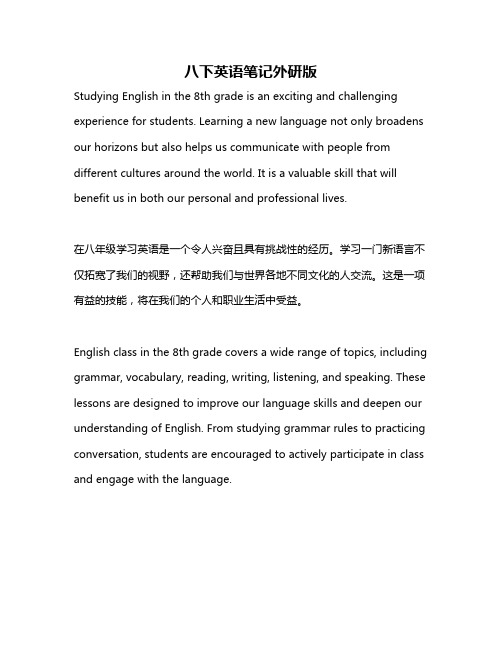
八下英语笔记外研版Studying English in the 8th grade is an exciting and challenging experience for students. Learning a new language not only broadens our horizons but also helps us communicate with people from different cultures around the world. It is a valuable skill that will benefit us in both our personal and professional lives.在八年级学习英语是一个令人兴奋且具有挑战性的经历。
学习一门新语言不仅拓宽了我们的视野,还帮助我们与世界各地不同文化的人交流。
这是一项有益的技能,将在我们的个人和职业生活中受益。
English class in the 8th grade covers a wide range of topics, including grammar, vocabulary, reading, writing, listening, and speaking. These lessons are designed to improve our language skills and deepen our understanding of English. From studying grammar rules to practicing conversation, students are encouraged to actively participate in class and engage with the language.八年级的英语课程涵盖了广泛的主题,包括语法、词汇、阅读、写作、听力和口语。
八年级下册外研版笔记
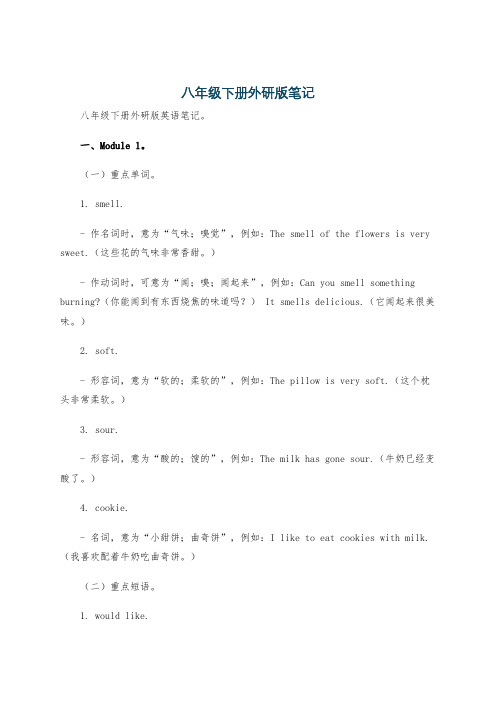
八年级下册外研版笔记八年级下册外研版英语笔记。
一、Module 1。
(一)重点单词。
1. smell.- 作名词时,意为“气味;嗅觉”,例如:The smell of the flowers is very sweet.(这些花的气味非常香甜。
)- 作动词时,可意为“闻;嗅;闻起来”,例如:Can you smell something burning?(你能闻到有东西烧焦的味道吗?) It smells delicious.(它闻起来很美味。
)2. soft.- 形容词,意为“软的;柔软的”,例如:The pillow is very soft.(这个枕头非常柔软。
)3. sour.- 形容词,意为“酸的;馊的”,例如:The milk has gone sour.(牛奶已经变酸了。
)4. cookie.- 名词,意为“小甜饼;曲奇饼”,例如:I like to eat cookies with milk.(我喜欢配着牛奶吃曲奇饼。
)(二)重点短语。
1. would like.- 意为“想要”,后接名词、代词或动词不定式,例如:I would like a cup of tea.(我想要一杯茶。
) He would like to go for a walk.(他想要去散步。
)2. a bit.- 意为“有点儿;稍微”,可修饰形容词或副词,例如:This dress is a bit expensive.(这条裙子有点贵。
) He runs a bit slowly.(他跑得有点慢。
)(三)重点句型。
1. —What's that smell?(那是什么气味?)- —It's delicious.(它很美味。
)- 这是用来询问气味并回答的常用句型。
2. It doesn't smell fresh.(它闻起来不新鲜。
)- 这是一个否定句,用来描述某物的气味不具备某种特征。
- 1、下载文档前请自行甄别文档内容的完整性,平台不提供额外的编辑、内容补充、找答案等附加服务。
- 2、"仅部分预览"的文档,不可在线预览部分如存在完整性等问题,可反馈申请退款(可完整预览的文档不适用该条件!)。
- 3、如文档侵犯您的权益,请联系客服反馈,我们会尽快为您处理(人工客服工作时间:9:00-18:30)。
(外研版)初中英语笔记初二(下)Module 1 Hobbies1. 基本句型:⑴主语+系动词+表语(+状语)Tom is very happy today.⑵主语+谓语(不及物动词)(+状语)The first book came out in 2003.⑶主语+谓语(及物动词)+宾语(+状语)He wrote a book in senior high school.⑷主语+谓语(及物动词)+间接宾语+直接宾语(+状语)His hobby has brought him enjoyment.⑸主语+谓语(及物动词)+宾语+宾语补足语(+状语)I didn’t want you to work too hard.⑹there be+主语+状语There is a very nice cup on the table.There are many story books in his schoolbag.一般来说,置于句首的多是时间、条件和原因状语,置于谓语部分之后的是地点、方式、原因、目的、时间和伴随成分。
2. tidy up “整理;收拾”。
当宾语是代词时,要放在tidy和up中间;当宾语是名词时,既可放在中间,也可放在其后。
如:Your room is untidy. Can you tidy it up?The students tidied up the classroom.(类似的还有turn on, turn off, put on, write down等动词+副词形式)3. listen to sb. do sth. 听见某人做某事。
I often listen to him play the violin.(类似于see, hear等后面可以接不带to的动词不定式)4. 当play后面接表示乐器的名词时,需要在该名词前加上定冠词the;如:play the piano, play the flute(笛子)当play后面接表示球类的名词时,该名词前不接任何冠词。
如:play basketball, play football5. as well as “也;还;并且”A as well asB (强调A而不是B),如:She is clever as well as pretty.We all want to visit Beijing as well as Shanghai.6. come out “出版;出现;(秘密等)传出;结果是”7. as a result “结果”,相当于so,前者用逗号隔开,后者反之。
He had some bad meat. As a result, he felt ill.as a result of “因为……”8. collect v.收集;collector n.收集者have a collection of…“收集……”如:I have a collect of dolls.9. take up 占用(时间、空间)The job takes up all my time.The big desk takes up too much space.10. at the end of 在……末尾11. ⑴sth. +happen+时间/地点“某时(某地)发生了某事The story happened in Beijing in 2008.⑵sth. happen to sb. “某人出了某事(常指不好的)”A car accident happened to her this morning.⑶sb. happen to do sth. 或It happens/happens that…某人碰巧做某事。
I happened to meet a friend of mine in the street yesterday.Module 2 Friendship1. 宾语从句(即放在动词后面作宾语的句子):㈠宾语从句的三要素:引导词:that,if/whether,疑问词语序:陈述语序(较特殊的如:)时态:①主句的时态是现在时,从句可用任意所需时态。
如:Please tell us where he is.②主句的时态是过去式,从句要用相应的过去式。
如:He told me that he was tired.③从句叙说普遍真理或客观规律时,则用一般现在时。
如:The teacher told us that the earth goes around the sun.㈡that 引导的宾语从句:(多数可省略)谓语动词表肯定概念,接that 引导的从句的谓语动词不可有疑问的含义,多是表示观点、看法、意念、要求等方面概念的词, 如:believe, feel, hear, hope, expect, explain, prefer, promise, report, say, see, tell, think, understand, wish, warn 等。
Betty thinks (that) trees improve the air.I hope that it will be snow this winter.㈢whether/if 引导的宾语从句:whether/if “是否”,常表达不确定概念。
如:He asks whether/if we will go fishing on Sunday.whether 与if 一般可通用,但以下情况只用whether : ★和or not 连用:I don ’t know whether he will come or not.★动词不定式前:He didn’t know whether to stay or not.★介词后:I’m not interested in whether she will go shopping.★宾语从句位于句首;★带有discuss(讨论)、decided(决定)、doubt(怀疑)等词。
㈣疑问词引导的宾语从句:(who, when, where, what, why, how…)注:在疑问词引导的宾语从句中,一定要用陈述句语序。
He asks how we can help protect the environment.They haven’t decided where they should go for the holiday.2. a couple of“一些,几个”;They will be back in a couple of weeks.a couple of作主语时,谓语动词用单数:There is a couple of boys waiting for you.3. day by day “一天比一天地;每天;日益”,指不断发生变化的。
He grew stronger day by day.day after day “一天天地”,指不断重复的。
4. ①remember doing sth. 记得曾经做过某事。
I remember meeting her at a party once.②remember to do sth. 记住要去做某事。
Remember to close the windows before you go out.5. find+复合宾语⑴find+宾语+名词The teacher finds the girl a good singer.⑵find+宾语+形容词I find English grammar very difficult.⑶find+ it+宾语补足语+动词不定式He found it very hard to answer the question.⑷find +宾语+介词短语(或过去分词,现在分词)I found the cat under the bed.6. good luck with sth.good luck to sb.7. by the way 顺便说in the way 挡路;妨碍on one’s way/ on the way 在路上8. worry about=be worried about “担心……”Don’t worry about me. I am not a child any moer.9. ①far away “遥远的”,在句中做表语、状语和后置定语。
(be) far away from 远离……The school far away from my home.②faraway “遥远的”,可做名词的前置定语。
He lives in a faraway village.10. lonely “孤独的”,指心理感受;alone独单;独自(无旁人)I’m not lonely though I am alone.11. make friends with 与……交朋友12. be close to 离……近Module 3 on the radio1. to +v.与v.-ing作宾语:一般来说,不定式表示将来的动作或行为,而v.-ing形式表示经常性的、一般性的动作或行为及正在进行的动作或行为。
2. 答谢时常用的表达方式:Don’t mention it. Not at all.You’re welcome. That’s all right.It’s my pleasure.3. ①look out=watch out=be careful “小心;当心”②look out for sb. / sth.“留心某人或某物”。
.Look out for snake!③look out of 向外看;look down 向下看;look up 向上看。
4. need to do sth. 需要做某事。
We need to speak English well.need doing sth. =stn. need to be done. 某物需要……Her room needs to be cleaned.5. keep doing sth. 一直做某事;继续做某事。
They kept talking about it.6. ①prepare sth. 准备某物。
Mother was preparing dinner in the kitchen.②prepare for sth.=get ready for 为……做准备③prepare to do sth. 准备做某事7. ①explain sth. to sb. 向某人解释某物The teacher explained the problem to class.②explain+从句He explained why he was late for school.8. seem 做连系动词,“似乎;好像;看起来”①seem+名词。
